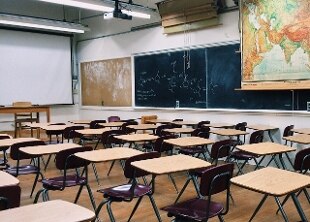Share
16 September 2019There are 12 million children in the world who risk never entering a classroom, an army of people who, without education, are condemned to remain on the margins of society. Estimates come from UNESCO that raises the alarm that in the last ten years the rate of schooling has not increased and reaffirms that only an inclusive and quality education guarantees a healthy intellectual development that allows man to fully integrate into a company.Little girls, problem in the problem
Instead, in 2018 alone, 258 million children and adolescents were not given access to the school due to wars, conflicts or climatic disasters, one sixth of the world population between 6 and 17 years. And the problem in the problem is the little girls who, said UNESCO director Audrey Azoulay, "continue to face the greatest obstacles to school access". According to projections of the United Nations agency, 9 million primary-age girls will never set foot in a school class compared to 3 million children. Of these, 4 million live in sub-Saharan Africa. Their destiny is to stay at home to help the family.
Rich countries and poor countries
All this underlines the great difference that remains between the richest and poorest countries. In low-income countries, 19% of school-age children (aged 6 to 11) are out of school, compared with 2% in high-income countries. The gap widens further for adolescents: about 61% of all young people between the ages of 15 and 17 do not attend school in low-income countries, compared to 8% in high-income countries. And if the current trend does not change in the next ten years, one child in six will remain out of school and only six out of ten will be able to access secondary education.
Agenda 2030 for sustainable development
The world, Unesco emphasizes, will not have achieved, therefore, one of the goals that the international community has set in the 2030 Agenda for sustainable development which is to guarantee everyone an inclusive and quality education. The invitation to governments, therefore, is to do more because UNESCO says the situation is not irrecoverable. The goal of a good education for all can be achieved both through a more serious commitment by governments and an increase in funding. "We need a real commitment on the part of every government, supported by real financial means, so that the result is achieved," said the director of the UNESCO Institute of Statistics, Silvia Montoya.
UN Assembly in days
A few days after the UN General Assembly which will examine progress on sustainable development, UNESCO concludes, it is important to underline the urgency of serious measures regarding the quality training offer.

